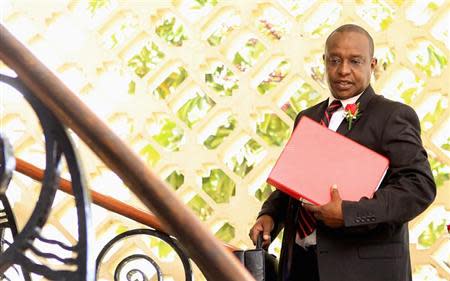Kenya plans more tax reforms after new VAT law

By Duncan Miriri NAIROBI (Reuters) - Kenya plans to streamline its income and excise taxes and broaden the tax base to improve efficiency and generate more revenues, its finance minister said on Tuesday. East Africa's biggest economy needs to increase revenues to cover a growing public sector wage bill under a new system of devolved government and plug a widening deficit. The finance ministry earlier this year revised its Value Added Tax (VAT) bill to make all but essential commodities subject to VAT to raise an additional 10 billion shillings a year. "We are now prioritising excise tax and income tax," Treasury Secretary Henry Rotich told a joint International Monetary Fund (IMF) and government conference on the economy in the capital, Nairobi. Rotich in June set the budget deficit for the 2013/14 (July-June) fiscal year at 7.9 percent of the gross domestic product, higher than what the markets had expected. The tax base for excise duty had eroded in the last 10 years which analysts say is because the law was so complex it hindered enforcement in a country where tax evasion is rife, he said. "On the income (tax) side we are also looking at how to widen the base and also looking at whether there are opportunities to lower the rates," he said. Many low-income Kenyans are frustrated at the jump in prices after the new VAT bill came into force this month. Rotich said a review of income tax rates might lead to a fall in an individual's tax burden if more earners were paying the tax. Kenya collects 22 percent of its annual gross domestic product in taxes each year, Rotich said, some five percentage points below developed emerging markets like South Africa. "Right now it (tax law) is so complex that people don't understand. We are for compliance," Vimal Shah, chairman of the Kenya Private Sector Alliance, a business lobby, told Reuters. Bob Collymore, chief executive of the country's biggest telecoms operator, Safaricom, warned further tax hikes could stunt growth in services like mobile money transfers that have deepened financial inclusion in the country. The government imposed a 10 percent excise tax on transfers using its M-Pesa service late last year. "We shouldn't fall for the temptation of increasing the tax again. If you see the temptation to move that to 15 or 20 percent, then it will kill the industry," Collymore said. Antoinette Sayeh, Africa director at the IMF, said raising revenues was not enough, urging authorities to raise the efficiency and quality of public spending as well. "This will create fiscal space, which is obviously important for infrastructure, where large gaps already remain...to ensure scarce public resources are used well," Sayeh said.

 Yahoo Finance
Yahoo Finance 